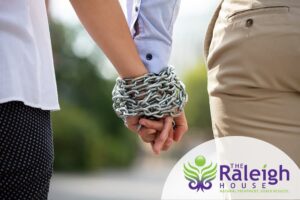
Things started out normal enough. You had a good relationship with your significant other or loved one. But then they started abusing drugs or alcohol and your whole relationship changed. Maybe you started covering for their actions, thinking they’re just stressed and going through a rough time. But before you knew it, your own behavior evolved into something else.
Over time, every thought and action was either in response to your loved one’s destructive behaviors or in anticipation of what they may want or need. Your heart was in the right place. After all, it’s your duty to support the someone you love, isn’t it? The truth is, codependency and addiction are a dangerous dynamic that can completely upend your relationship.
The first step of breaking codependency in addiction is recognition. In this post, we’ll highlight some of the most common signs of codependency in addiction, so you and your loved can start on a path toward recovery and healing.
What is Codependency?
First, it’s important that we first take a step back and define what codependency is. Codependent behavior is where two people rely on each other to get something they can’t do themselves. Let’s break it down by role in the relationship:
The Drug or Alcohol User
The person struggling with the addiction depends on their loved one for support. Addiction often makes it difficult for their needs outside of the drugs or alcohol to be met. So, the loved one takes care of these things, like giving them money to maintain their substance abuse or covering for them if they are too hungover to go into work. These behaviors help this individual continue their addiction driven lifestyle.
The Loved One
This individual feels the need to support and care for their loved one who is struggling with their addiction, not realizing that their love and support is enabling the substance abuse. This often leads to the drug or alcohol user manipulating their loved one into keeping their addiction going.
The addict is dependent on the substance, while the loved one is dependent on the addiction and how the situation makes them feel needed.
4 Signs of Codependency to Lookout For
1. You Feel Responsible for Your Loved One
Take a minute to ask yourself if you feel responsible for your loved one’s addiction. Codependent people often feel a sense of worthlessness if they’re unable to fix a situation. You enjoy providing solutions even if that behavior ends up enabling your loved one’s addiction in some way.
For example, your loved one drinks too much and sleeps in so they miss work. You feel a strong urge to solve the problem. So, you call their boss and make up an excuse. It’s not something you wanted to do, but solving that problem gives you a sense of purpose.
2. Your Own Needs Are Not Being Met
With codependency and addiction, it’s common for the loved one to put their own needs last. Do you often tell yourself that your needs are not important? Or find yourself always saying yes to help your loved one struggling with addiction, even though you want to say no?
These are some classic signs of codependency. Your life seems to be wrapped around the needs of someone else. Instead of focusing on your own needs first, you hope that all the good feelings you need will come from helping the other person. You might even put up with their destructive behaviors out of the fear of losing your connection to them.
3. You Tend to Deny or Ignore Problems
Deep down, you know that your loved one’s substance abuse is an issue. But with codependency caused by addiction, it’s common for you to ignore those problems and go on as if everything is okay.
In this kind of relationship, it’s even common for the loved one to assume some traits of the person with the addiction. Denial is often at the top of that list. Despite what other people might tell you, you’re not convinced that there’s a problem – just like your loved one doesn’t see how their addiction is affecting those around them.
4. You Make Excuses for Your Loved One’s Addiction and Destructive Behaviors
You realize that your loved one’s substance abuse and behavior is putting a strain on your family. But you can’t escape making excuses for them. While it’s normal to want to help them, the reality is that covering for them is enabling their behavior.
The excuses might be your way of protecting your loved one from the consequences of their addiction. This is a major sign of codependency. You might think you are protecting them, but often your excuses are actually helping to lower their motivation to seek treatment and recover from their substance abuse.
Treatment for Codependency and Addiction
Your loved one can overcome their substance abuse with the right treatment program. At The Raleigh House, we offer effective addiction treatment that leverages an evidence-based approach to help your loved one find long-term recovery.
But our expertise doesn’t stop there. We know that codependent behavior because of addiction is common within families. That’s why our treatment approach is focused around the family system. When your loved one comes to us for help, we also work with you to help heal your family from the destruction substance abuse has caused.
Find A Path to Healing at The Raleigh House
You don’t have to stay trapped in your loved one’s addiction. There is a way for both you and your loved one to get past substance abuse together and heal as a family. At The Raleigh House, we have over 10 years of experience helping families just like yours break free from addiction and move forward with their lives. At our wellness lodge designed to provide a unique and effective treatment experience, there is hope for recovery.
Fill out the form below to learn more about our treatment process. And if you have any questions, don’t hesitate to contact our admissions experts today.

